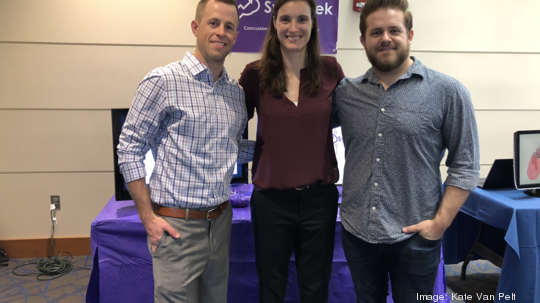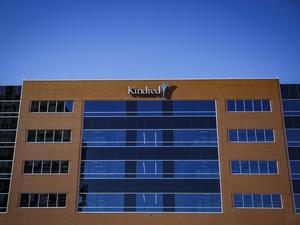
When Kate Van Pelt got her doctorate in kinesiology and exercise science, starting a company wasn’t on her mind. But she kept thinking of the issues in concussion care and knew she wanted to find a solution.
She fell in love with the studies of the brain when she started working in traumatic brain injury research labs. She wanted to understand how the brain was both resilient and fragile.
She soon learned she was able to combine her love for learning about the brain to her love for sports when she started work in concussion research.
Van Pelt, a former hockey player, saw first-hand the effects of concussions on some of her friends. Now, she wants to make concussion assessment easier, more effective and accessible.
Van Pelt launched Synaptek in 2019 as a concussion-specific platform for clinicians who work with athletes. She heads it as co-founder and CEO.
“Right now, too many concussions are going undiagnosed, or there’s issues throughout the recovery process,” she said.
Van Pelt said treatment isn’t currently optimized for mobile systems, with many of the records done on paper or electronic medical records systems. Mobile programs would be beneficial in the sports medicine space, where injuries are often received on a field, she said.
“Our vision is to enable athletes to participate in their activity for as long and as healthy as possible, so they can be successful on and off the field,” Van Pelt said.
The Lexington-based company’s goal is to reduce the amount of human error that goes into the diagnosis of a concussion and get concussion patients immediate attention when a clinician isn’t available.
Synaptek has two full-time employees including Van Pelt and her husband, Doug Van Pelt, co-founder and chief operating officer. James McCollum, co-founder and chief of product, is a part-time employee.
Synaptek, which participated in Launch Blue's inaugural demo day earlier this year, is a raising seed funding round with a goal of $500,000 to employ all co-founders full-time and promote more costumer innovation features. The company recently received a $216,000 grant from the National Science Foundation for Small Business Innovation Research.
While the founders would not disclose how many clients Synaptek serves, they did note the company has secured a multi-year partnership with the University of Kentucky Orthopedic Surgery and Sports Medicine in July. UK had participated in Synaptek’s Pilot program, working with more than 500 athletes.
Hear more from Van Pelt in this Q&A:
What problem is Synaptek solving?
Throughout my research experience, and growing up playing ice hockey, I had interacted with a bunch of researchers and clinicians, and I saw and experience how nuanced concussion care is. Athletic trainers and clinicians have to complete a multifaceted assessment – which means they have to do multiple assessments and that means there’s a lot of data. There’s a lot to manage. It creates a lot of admin work for them.
Athletic trainers care for anywhere between five and 520 athletes. It’s a really burdensome and intuitive application on their phone so the clinician can focus on clinical care and not admin work.
What is the meaning behind the name “Synaptek?”
It’s a mix of “synapse” from the brain, but also “technology,” and how we’re leveraging technology to really improve and promote brain health, but also help communication and make connections between data just like a synapse would in your brain. It was really the mix of those two words and concepts.
What is your long-term goal for Synaptek?
Our goals with the data we collect and the grants we receive is to make concussion assessment more effective by reducing subjectivity in it. Right now, concussion assessment is like a clinical-style interview, where your clinician would be asking you how you’re feeling or asking you different questions. There’s some unfortunate human error and subjectivity in that. We’re looking to really reduce that and making the diagnosis and treatment more effective.
The last piece is accessibility... Being available on your mobile phone means you have access anytime, anywhere, but also making it more accessible to schools or environments that may not always have a clinician available and really kind of expanding the ability to make clinical decisions and diagnoses when a clinician isn’t available.









